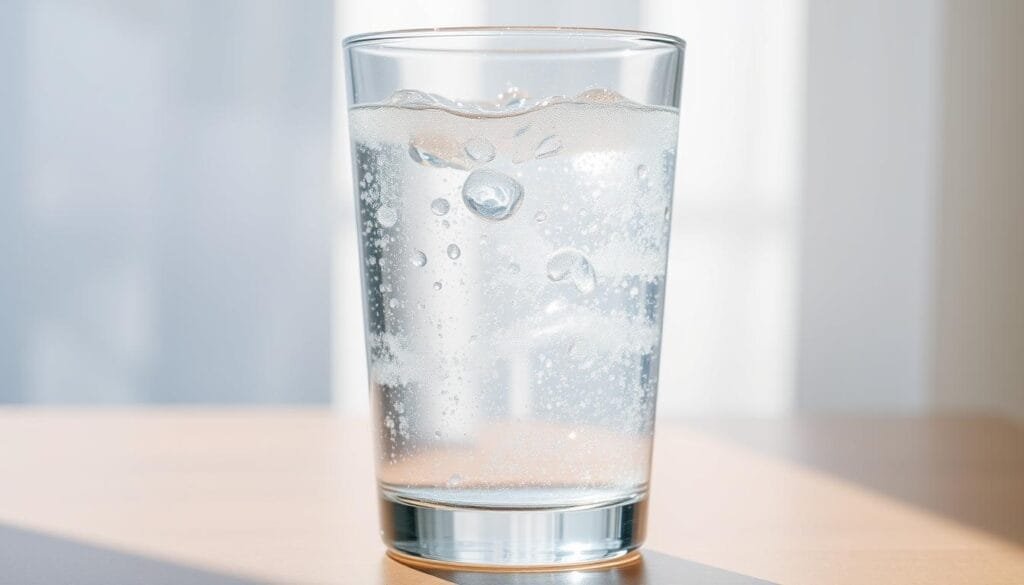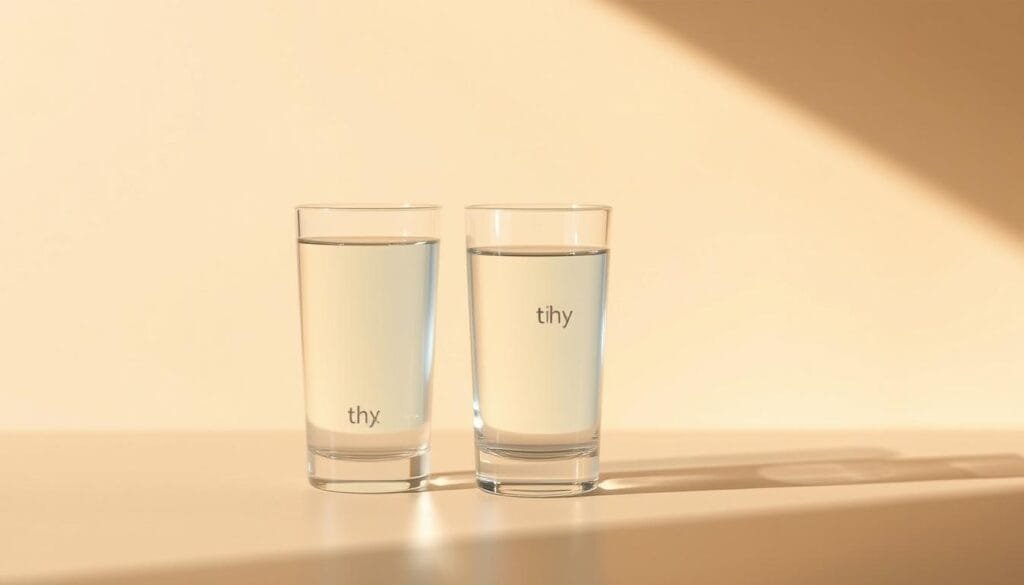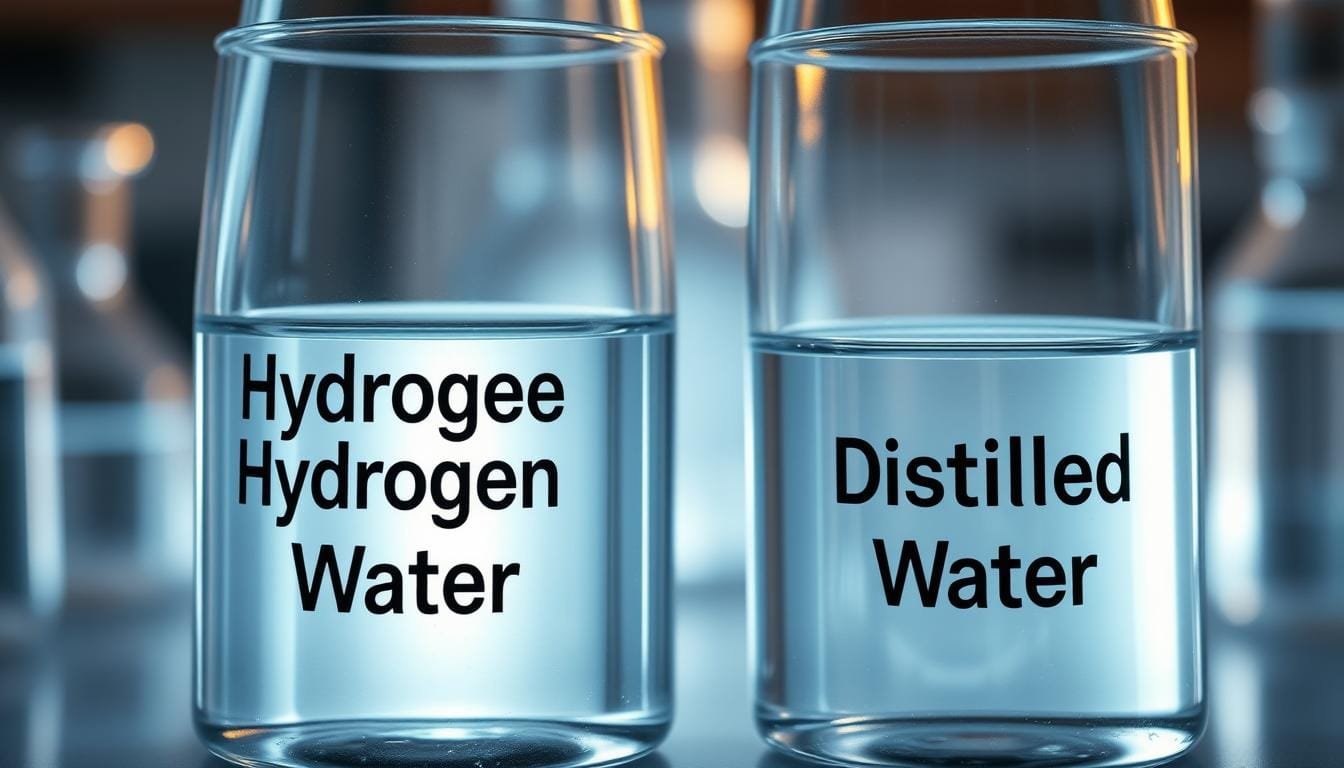Currently Empty: RM0.00
Which option truly fits a Malaysian household: a trendy infused drink that promises antioxidant perks, or ultra-pure steam-condensed liquid used in labs and appliances?
This introduction helps people weigh health priorities, budget, and daily use. It explains that one product is regular drinking water infused with extra gas to offer possible benefits, while the other is made by boiling and condensing steam, leaving nearly no dissolved minerals.
Research on claimed benefits is limited and mixed, so readers should balance hope with current science. Both are safe: the infused option is GRAS and the distilled kind is ideal when purity matters most.
Wellness Concept in Malaysia offers friendly advice. Contact via WhatsApp: +60123822655 during Mon-Fri 9:30 am-6:30 pm and Sat-Sun 10 am-5 pm for guidance based on local needs.
Key Takeaways
- Compare goals first: taste and potential antioxidant support versus lab-grade purity.
- Evidence for health benefits is emerging but not conclusive.
- Both choices are safe for drinking; storage and cost differ.
- Distilled is best for appliances and sensitive uses; infused options suit health-focused people and athletes.
- Contact local Wellness Concept for tailored advice in Malaysia.
What they are and how they’re made: hydrogen-enriched water versus pure distilled water
A quick look at production reveals why one option adds a small gas load while the other removes nearly everything.
Gas‑infused drinking option
hydrogen water is plain water that manufacturers dissolve with extra hydrogen molecules so the body can access gas beyond the H2O base. Producers seal the liquid in non‑permeable cans or pouches to retain gas. Consumers may also use tablets or home machines to create hydrogen-enriched water on demand.

Ultra‑pure liquid made by distillation
distilled water is produced by boiling and condensing steam back to pure water. This process strips away over 99.9% of dissolved minerals and many impurities, which gives it a notably flat taste. That extreme purity makes it preferred for labs, medical uses, and appliances that need no mineral buildup.
Key production differences
- Molecular hydrogen is the active component in the gas‑infused type; distillation focuses on removing ions and contaminants.
- Hydrogen-enriched options depend on packaging integrity and gas concentration for freshness.
- Distilled liquid is stable for storage and ideal where low total dissolved solids matter.
If readers in Malaysia want guidance, Wellness Concept is reachable via WhatsApp: +60123822655 during Mon‑Fri 9:30 am–6:30 pm and Sat‑Sun 10 am–5 pm for tailored advice.
Hydrogen water vs distilled water: benefits, drawbacks, and what studies say
Study outcomes vary widely, with measurable gains mainly in targeted patient groups and athletes.
Antioxidant activity and oxidative stress. Researchers suggest molecular hydrogen can neutralize certain free radicals and lower oxidative stress in some situations. An eight-week trial of 49 liver cancer patients receiving radiation therapy found that drinking 1,500–2,000 ml/day reduced hydroperoxide levels and helped maintain higher antioxidant activity versus controls.
A smaller placebo-controlled study in healthy volunteers drinking 600 ml/day for four weeks showed no change in oxidative stress markers. This suggests effects depend on baseline health, dose, and duration.
Performance and wellness angles
Small athlete trials hint at benefits. Ten male soccer players who drank 1,500 ml had lower blood lactate and less muscle fatigue after exercise. Eight cyclists using 2 liters/day showed improved sprint power.
Metabolic syndrome data are promising: about 0.9–1 liter daily for 10 weeks improved LDL, total cholesterol, HDL, antioxidant activity, and reduced inflammatory markers like TNF-α.
- Effects vary by product concentration, packaging, and how quickly the drink is consumed.
- Most reports are positive or neutral; the product is GRAS safe.
- Distilled option offers predictable purity without antioxidant claims and is preferred when mineral-free water is needed.
| Context | Typical Dose | Reported Effects | Notes |
|---|---|---|---|
| Radiation therapy (liver cancer) | 1.5–2.0 L/day | ↓ Hydroperoxide; ↑ antioxidant activity | Targeted clinical benefit in patients |
| Healthy adults (placebo trial) | 0.6 L/day | No change in oxidative stress markers | Short duration; small sample |
| Athletes (soccer, cyclists) | 1.5–2.0 L/day | ↓ Lactate, ↓ fatigue, ↑ sprint power | Small studies; encouraging for recovery/performance |
| Metabolic syndrome | 0.9–1.0 L/day | Improved lipids, antioxidant activity, ↓ inflammation | Longer trial; needs replication |
If readers want a deeper look at clinical background and local guidance, Wellness Concept in Malaysia can help — see this detailed post on cancer prevention strategies and contact options: hydrogen water for cancer prevention. For immediate advice, WhatsApp +60123822655 (Mon-Fri 9:30 am–6:30 pm; Sat-Sun 10 am–5 pm).
When to choose each: daily hydration, special uses, and safety
Households should match a water type to practical needs: hydration, appliance care, or targeted wellness routines.
Daily drinking water choice hinges on goals. For general good health, consistent intake of clean liquid matters most. Regular water that meets safety standards is effective for most families in Malaysia.
Appliances and lab needs call for pure water. Distilled water is nearly mineral-free and prevents scaling in irons, humidifiers, and lab instruments. It reduces maintenance stress and protects sensitive equipment.
Wellness and performance uses may steer some toward drinking hydrogen products. Concentration and packaging affect benefits; users should consume quickly after opening and choose reputable brands.

| Use-case | Recommended type | Key advantage |
|---|---|---|
| Daily household drinking | Regular water | Simple, affordable hydration for good health |
| Appliances & labs | Distilled water | No mineral buildup; consistent purity |
| Athletes & wellness trials | Drinking hydrogen products | Possible recovery support; prompt use required |
For tailored local advice, Wellness Concept offers guidance via WhatsApp: +60123822655 (Mon-Fri 9:30 am-6:30 pm; Sat-Sun 10 am-5 pm).
Your best choice, made simple: matching water type to your health goals with Wellness Concept
Matching a water type to daily needs makes the choice simple and practical for Malaysian households.
If you want pure liquid for appliances, labs, or medical uses
Choose mineral-free fluid when purity matters. It prevents scale in irons, humidifiers, and lab gear. That protects equipment and keeps performance consistent.
If you want potential antioxidant benefits and recovery support
For wellness-curious people, hydrogen water may be worth trying. Products come in cans, pouches, or are made by home machines. Small studies report lower lactate after exercise and improved markers in some trials, but results vary.
Key tips: pick non‑permeable packaging, drink promptly after opening, and track how your body responds over a few weeks.
- If purity is the goal, the mineral-free option fits appliances, labs, and specific medical contexts.
- For recovery and antioxidant aims, hydrogen-rich products may offer benefits, though outcomes differ by person and routine.
- Alkaline water focuses on pH, while hydrogen-rich options target dissolved gas and antioxidant mechanisms.
Talk to Wellness Concept in Malaysia
They can personalise recommendations by type and use. WhatsApp +60123822655 during business hours for friendly support (Mon–Fri 9:30 am–6:30 pm; Sat–Sun 10 am–5 pm).
Conclusion
,In short, the evidence points to promise in targeted settings but remains limited for broad health claims.
Specialty choices introduce extra molecules in the infused option that may affect oxidative stress and antioxidant activity in some trials, while the mineral-free option offers predictable purity for appliances and labs.
Small studies show benefits for radiation patients and athletic performance, yet larger research is needed. The infused products are GRAS safe; packaging and prompt use matter for gas retention.
For personalised guidance in Malaysia, read a detailed comparison or message Wellness Concept on WhatsApp +60123822655 (Mon–Fri 9:30 am–6:30 pm; Sat–Sun 10 am–5 pm) and visit understanding hydrogen options.
FAQ
What is the main difference between hydrogen-enriched drinking and distilled pure liquid?
The enriched version contains extra molecular hydrogen dissolved into the liquid to offer possible antioxidant effects, while the distilled type is created by boiling and condensing steam to remove minerals and impurities, producing very pure, neutral-tasting fluid used for appliances and lab work.
How is enriched fluid produced compared to distilled?
Enriched bottles or generators infuse additional gas molecules into plain drinking using electrolysis or pressurized methods. Distillation heats the liquid to produce steam, then condenses it back to a mineral-free form.
Are there proven health benefits to drinking the enriched kind?
Some small studies suggest reduced oxidative stress and modest anti-inflammatory effects in certain situations, while other research finds mixed results. Evidence for improved athletic performance or broad clinical benefits remains limited and not definitive.
Is distilled liquid harmful to drink every day?
Drinking distilled regularly is generally safe, but because it lacks minerals such as calcium and magnesium, it may not be ideal as the sole source of daily electrolytes for long periods. People who rely mainly on food and varied beverages usually meet mineral needs.
Can enriched fluid help with recovery after exercise or radiation therapy?
Some trials report reduced markers of inflammation and oxidative damage after intense exercise or certain treatments, but findings vary. It may help some people modestly, yet it should not replace medical care or proven recovery strategies.
Which type is better for household appliances and lab use?
The distilled option is the preferred choice for irons, humidifiers, laboratory experiments, and devices sensitive to mineral buildup because it prevents scale and contamination.
Is the enriched product safe for daily consumption?
For most healthy adults, occasional or daily intake of enriched fluid appears safe when sourced from reputable brands. Always check product quality and consult a healthcare professional if pregnant, nursing, or managing medical conditions.
How does each option affect taste and mouthfeel?
Distilled liquid tastes flat and neutral due to absent minerals. The enriched option tastes similar to regular drinking but may feel slightly lighter, depending on dissolved gas concentration.
Are there regulatory standards or quality claims consumers should check?
Look for third-party testing, clear concentration data for dissolved molecules, and manufacturer transparency about production methods. For distilled purchases, verify purity and certification if using for medical or lab purposes.
When would someone in Malaysia choose one over the other?
Residents often pick distilled for appliance care, lab needs, or when very pure fluid is required. Those seeking potential antioxidant support or athletic recovery may try the enriched option as a supplement while maintaining a balanced diet.
How can people learn more or buy products locally?
Consumers can contact Wellness Concept in Malaysia for product details and advice. WhatsApp +60123822655 — Open Mon-Fri 9:30 am–6:30 pm; Sat–Sun 10 am–5 pm.


